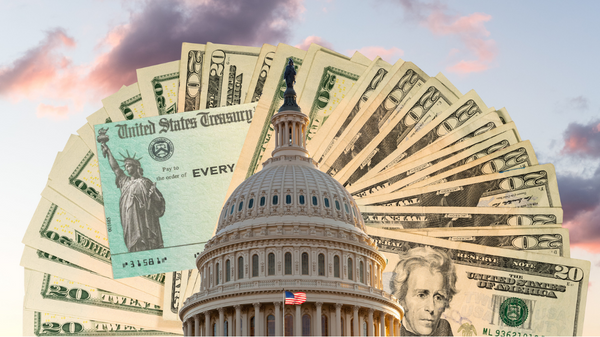As the festive season approaches, with its twinkling lights and merry carols, the item topping my Christmas wish list is fiscal responsibility from Congress and the administration.
If this sounds like an economist conflating policy with goodwill, remember this: In a world where holiday wishes usually lean toward “stuff” — gadgets, games, and glittering jewels — my wish would bring long-term prosperity, stability and cheer far beyond the fleeting joy of unwrapping presents.
Here are two small steps Congress could take to jumpstart the fiscal stability process that are uncontroversial and bipartisan (or at least they should be).
However, before I begin, I’ll remind you why we shouldn’t let Congress fool us into believing fiscal responsibility is impossible. In the last four years, public debt has increased by 53% thanks to the massive expansion during the Covid emergency. Huge gains are possible simply by eliminating temporary programs that were created.
As much as people enjoy the illusion of free money handed out by Uncle Sam, it’s been unmasked by inflation. Would it be terrible to go back to where we were before the pandemic, when the economy and wages were growing, and most Americans liked that direction?
The first step involves curtailing emergency-spending loopholes. Emergency spending is intended for unforeseen, urgent expenditures arising from natural disasters, economic crises, or other unexpected serious situations. It’s typically exempt from ordinary budgetary constraints and processes. The idea is for governments to respond quickly without the delay of standard budgetary procedures.
Unfortunately, the emergency-spending label has long been abused. Regular, predictable expenditures are often labelled as “emergencies” to bypass normal budgetary controls and scrutiny. This ability to spend without much oversight is awfully convenient for politicians and, as a result, makes emergency spending a significant driver of government debt. In a new study of the issue, Romina Bocca and Dominik Lett of the Cato Institute write: “Congress has designated $12 trillion in inflation-adjusted emergency and related cap-exempt spending over the last three decades. That’s 43 percent of the current public debt without including interest costs.”
There’s no way this much spending is based on unforeseen emergencies. Congress can give our children, who (as always) will probably foot the bill, quite the gift by deciding now to finally take on emergency spending reform. That would involve more transparency, stricter criteria about what constitutes an emergency, and better integration of emergency spending into the overall fiscal framework to ensure that such funds are used effectively and responsibly.
The second step is to tackle the staggering issue of improper payments made by the federal government, which soared to $236 billion in 2023. A new paper by Matt Dickerson at EPIC for America notes that this number represents a 5.42% improper rate. This adds up to more than the combined total funding of several major government departments, even surpassing the $185 billion provided for the U.S. Army in the same year.
Since 2015, improper payments have increased by $100 billion. Over the last 20 years, the federal government reported a total of at least $2.4 trillion in improper payments. Considering less than 5% of improper payments were underpayments, and that the federal government barely even tries to recover overpayments, stopping this trend would make a big difference in reducing budget deficits.
I think we can all agree that improper payments that grow year-after-year are symptomatic of the sloppiness with which the government manages taxpayers’ hard-earned money. Putting an end to this particularly unacceptable spending should be a no-brainer that transcends bipartisan politics.
Over at the Heritage Foundation, Rachel Greszler rightfully notes that legislators “must verify that government payments are valid, hold bad administrators accountable, and minimize Americans’ reliance on federal programs.” She is correct that reducing the reliance on programs that experience the largest amounts of improper payments, either as a share of the program (Earned Income Tax Credit) or in absolute dollars (Medicaid), is essential. But also, bureaucrats themselves should be held accountable for their mistakes.
These small changes won’t fix everything. Only a reform of entitlement programs would do that. And embracing fiscal responsibility might not bring the immediate thrill of unwrapping a new toy or gadget — especially for our kids. However, its benefits would endure. Changes could signal a commitment to a more stable and prosperous future not just for ourselves, but for generations to come. This Christmas, let’s hang our stockings with a hope for fiscal sanity, a gift that truly would keep on giving.
Veronique de Rugy is the George Gibbs Chair in Political Economy and a senior research fellow at the Mercatus Center at George Mason University. To find out more about Veronique de Rugy and read features by other Creators Syndicate writers and cartoonists, visit the Creators Syndicate webpage at www.creators.com.
COPYRIGHT 2023 CREATORS.COM.
For more from Budget & Tax News.
For more public policy from The Heartland Institute.











